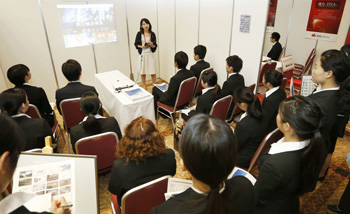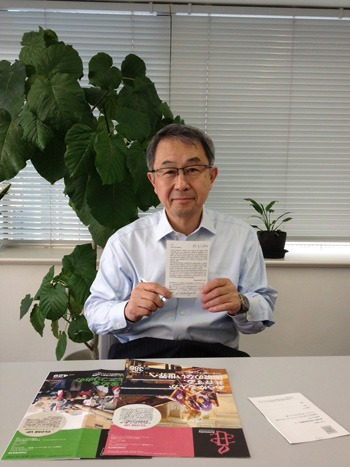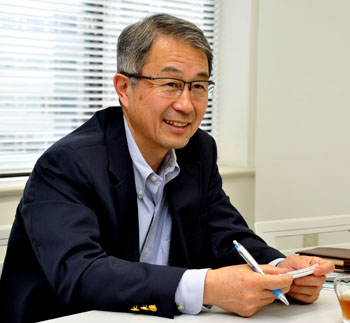|
Aug. 20, 2012
Advance your career by studying abroad
Year on year, the proportion of students studying outside their home country has continued to rise. The most current OECD (Organization for Economic Cooperation and Development) statistics reveal that the figure stood at a colossal 3.7 million in 2009, up from 2.1 million in 2000. It is estimated by Statistics Canada that 7 million students will be studying abroad by the end of the decade.

Sought-after: Keidanren (Japan Business Federation) holds a job-hunting seminar in Tokyo on Aug. 4, aimed at students who have experience studying abroad. KYODO
However, few trends are without their anomalies, and this is true in this case also — and one of the major ones is Japan. If we look back two years, to 2007, the number of Japanese students studying abroad stood at 56,060. The latest figure is 45,556, with the figure from the year inbetween standing at 52,849. It should be noted that these are the total figures for countries which reported statistics to the OECD.
Though we should add thecaveat that it remains a midranking nation in this regard,this against-the-tide movement certainly catches the eye. It isthrown into even sharper relief in the light of widely publicizeddrives by Japanese corporations to shift their focus to internationalmarkets; a combination which has resulted in flagship domestic businesses stepping-up their hiring of non-Japanese workers.
The consequences of this are already becoming apparent, with sharp falls in graduate employment reported — between 2007 and 2011, a drop of around 13 percentage points was recorded in the proportion of graduates who had found a job prior to graduation.
The diagnoses of the issue have been varied, ranging from, on the more hypothetical side, a less adventurous generation, exhausted from the rigors of secondary education, to a more considered analysis of the comparative weakness of the yen against other currencies in recent years.
Of course, these broad, sweeping analyses of this trend remain hypothetical and err toward the simplistic. Every person is different, and the motivations for a student choosing to study or not study abroad will be unique to each. However, step back and the bigger picture remains the same: fewer Japanese students are studying abroad.
While the world continues to recover from the effects of the global financial crisis, the consequences remain to be seen — as does the longevity of this trend. But it is perhaps exactly this uncertainty which makes an international master's degree such a sound investment.
It is well known that a graduate degree will increase your earnings premiums. A report from Georgetown U niversity's Center on Education and the Workforce confirms that holders of master's degrees stand to earn, on average, $400,000 more over the course of their lifetimes than those with only an undergraduate education, with a Ph.D. adding on a further $600,000. Professional degree holders trump the lot though, earning, on average, $300,000 more than Ph.D. holders.
To study a graduate level qualification overseas can add further value still. It is a commonly acknowledged truth, as alluded to above, that prestigious employers are placing a higher and higher value on international competence. The 2011 QS Global Employer Survey Report found that six out of 10 employers give extra credit for international student experience, with 80 percent of these actively seeking students who have studied abroad.
Being able to communicate in a different language (competency in English is highly valued), understanding various cultural nuances, showing that you have the confidence and assurance to stand on your own two feet outside of your comfort zone, these are all things on which employers place a premium.
Additionally, study abroad can be an invaluable springboard to an international career. After all, sometimes the best opportunities are reserved for those who are willing to make an extra effort in seeking them out. Though Japan is and will remain a major global power, the continually rising star of China, the established Asian Tiger economies, and the up and coming ASEAN (Association of Southeast Asian Nations) states offer a glut of opportunities in the region, as do Europe and the United States.
The potential rewards, then, are plentiful and the investment can certainly be one worth making. Of course, choosing where and what to study can be a daunting prospect. In order to make this decision a little easier, there is the QS World G rad School Tour, a series of university fairs that allow candidates to meet highly rated universities from around the world face-toface. The events feature panels and seminars, scholarship and funding advice, and admissions tips direct from the people in charge who make the decisions.
The tour comes to Tokyoon Oct. 30. You can registerfor the free event at http://graduateschool.topuniversities.com/world-grad-school-tour.
Text provided by QS Quacquarelli Symonds and written by Mansoor Iqbal, education writer at QS.
Master's degree in U.S. leads to success
Resumes don't really get more impressive than Hideki Wakabayashi's. A career that began with Yamaha Corp. has taken him to the Japanese Embassy in Washington D .C., the House of Councilors, where he served as the Democratic Party of Japan's minister of economy, trade and industry, and finally, to the executive directorship of the Japanese wing of one of the world's biggest and best-known nongovernmental organizations, Amnesty International.

Experienced: Hideki Wakabayashi, executive director of Amnesty International Japan, has an impressive resume. QS
Behind this career is a study abroad experience: two years spent at Michigan State University studying for a Master of Science in forestry, preceded by a one-year pre-forestry program at Eastern Michigan University. This was necessitated by his decision to study business at the undergraduate level at Waseda University.
"I realized that this was not the career path I wished to pursue when I was in my junior year, but it was almost impossible to so drastically change one's major in Japan," Wakabayashi said.
Studying abroad offered him a way out of this conundrum. A mixture of cultural and academic reasons led Wakabayashi to choose the United States and Michigan State University in particular.
"My generation grew up with American culture after World War II, in terms of television, film, food and lifestyle. I therefore felt a closer affinity to the U.S. than I did to China or Korea," he said. "I had taken a short intensive English course while in my sophomore year, which employed the 'Michigan Method,' and, of course, Michigan State was the country's leading agricultural university and offered a good forestry program."
Wakabayashi, who enrolled in his pre-forestry program in 1976 and graduated with his M.S. in 1979, was something of a studyabroad pioneer.
"Very few people went to study abroad," he said. "Japanese companies did not really appreciate the experience at the time." However, this was something that was set to change, with the advent of globalization in the 1980s.
"After I started working for Yamaha in 1980, Japanese corporations began to realize that Japan was competing on a global stage, for which the international way of thinking and foreign language skills were required," he said. "Then my experience began to be appreciated in society, even though I did not specifically get involved in the international business side at Yamaha.
"My international experience," he added, "has been and continues to be an advantage for my career."
In fact, it could be argued that it has played a greater part than his actual discipline-specific knowledge, which he says he has very rarely managed to employ, even at musical instrument maker and woodland and mountain resort-owing Yamaha. He advises that when looking for a course, you should ensure that it can offer an international milieu of students in order to maximize the benefits of the international experience.
He ascribes the recent downturn in Japanese students studying abroad to improvements in information technology rendering the experience of actually traveling abroad not as appealing to the young as it once was.
"I would say that contemporary young people tend to be inward-looking and are reluctant to study abroad. In the past, it was something to which many people aspired; now only highly motivated people and those for whom it is absolutely essential are now going abroad," he said. "In a sense, I think it is very natural that the number of students has decreased over the years with the advanced IT environment, in which people get foreign information from the computers whenever they want."
However, there is still much to be said, in Wakabayashi's opinion, for stepping out into the wider world.

Insight: Hideki Wakabayashi's international experience has been an advantage. YOSHIAKI MIURA
"I think, in general, it is important for more people to gain international experience because, needless to say, companies need people with diversified backgrounds, people who have individual competence when it comes to global competition," he said.
It is largely to his international experience that he ascribes his own career success.
"The confidence to be able to work in the international community has really worked to my advantage, particularly in terms of communication skills, which include not just language skills but an open-minded attitude bolstered by the experience of studying and working overseas. I am certainly making the most of my experience in my current job with an international NGO ," he added.
So, finally, what advice would he give to students thinking about following in his footsteps and embarking on an international career? He echoes the above points on his personal success.
"There are three things on which you should focus: communication skills, including good language skills — remember that writing and debating skills are as important as speaking skills, which people tend to focus on; being internationally open-minded and sensitive; and generally having a high level of general and specialized knowledge," he said.
Follow this man's advice, and who knows, perhaps one day this could be your illustrious career we're looking back on.
Text provided by QS Quacquarelli Symonds and written by Mansoor Iqbal, education writer at QS.
|